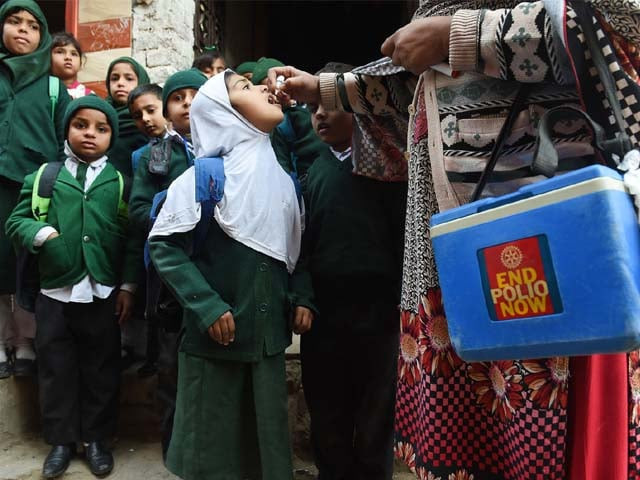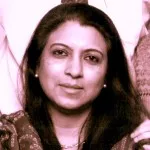When the World Health Organisation (WHO) declared India polio free on March 27, 2014, after it had not had a single case since 2009, I was filled with great pride. Knowing that India is densely populated, afflicted with poverty and has poor access to healthcare for millions, polio eradication was indeed something to celebrate. But as in every such situation, I naturally wanted to know how long it would take Pakistan to reach this milestone.
As India has put an end to the polio epidemic, its neighbour Pakistan remains one of the three countries in the world that are still trying to eradicate the disease. I thought to myself, four times larger in size than Pakistan and more populated, so if India could do it, why can’t Pakistan?
With fingers crossed, I have kept my eyes on the numbers ever since. Polio cases dropped in Pakistan from over 300 in 2014 to 54 in 2015. This gave me hope. In 2016, polio cases further went down to 20 and then to eight in 2017.
It must be said here that it is remarkable how the entire world of healthcare had come together, spending $16 billion in the global polio drive over the last 31 years, to eradicate a disease that has in the past left many children disabled for life.
So I was certain in my heart of my hearts that Pakistan would get there.
https://twitter.com/PakFightsPolio/status/1155807453969342464
Meet the 25 year old girl, who sets the perfect example of strong will and commitment. Role model for every woman, nothing can stop Shizza Illyas as she goes from door to door on her motorbike to help @Pakfightspolio end polio in Pakistan. 1/2 pic.twitter.com/micrL71iot
— PTI (@PTIofficial) July 28, 2019
But it was not meant to be and there are a confluence of factors that have prevented polio eradication from becoming a reality in Pakistan.
Amidst the politicisation of polio vaccines, not just polio workers, but the police officials accompanying them continued to be gunned down. Yet this still has not deterred the brave health workers from taking risks, high up in the mountains in Khyber Pakhtunkhwa (K-P) or in the ghettos in Karachi, from ensuring that children are given proper and timely access to vaccines.
Early this year, rumours made rounds on social media that children were dying as a result of polio vaccines, thus creating a panic among the thousands of households whose children had been administered these vaccines. In retaliation, health centres were set on fire. It was also reported that a man had divorced his wife after he found out that she ensured their family was administered polio vaccines.
A video also surfaced on social media recently, where children were made to pretend to be dead by a man who wished to prove how dangerous polio vaccines are. Given the spread of such misinformation in the digital age, the proliferation and rise of such videos is deeply concerning and could prove to be a serious roadblock.
The news that some children fell ill after being administered the polio vaccine in KP yesterday was fake - see it for yourself here - including the man who instructs the boys to feign illness and lie on the hospital bed
— omar r quraishi (@omar_quraishi) April 23, 2019
This man should be arrested immediately & prosecuted pic.twitter.com/WJja4O39vC
If all this wasn’t bad enough, just a couple of weeks ago we heard news of fake polio markers being sold in Pakistan, which parents were using to mark their children's finger to make it seem like they have already been given those ‘dangerous’ two drops. This only further compounds the already arduous job of Pakistan’s polio workers.
What also damages the effectiveness of Pakistan’s polio drive is when polio workers are unable to reach certain localities. It has been reported that 37,678 children missed a recent special immunisation drive which was conducted in Bannu, Lakki Marwat and North Waziristan. While many children could not be given polio drops because their parents refused, 11,853 children could not be reached altogether. An inability to get access to these children will only further complicate an already difficult task.
I have never, and will probably never be able to understand the reasons as to why parents choose to ensure that their children are not given polio drops. Why can’t these people understand how detrimental this kind of rumour mongering can be?
https://twitter.com/PakFightsPolio/status/1156142590783369217
The push-back against polio vaccines stems largely from a whole host of myths which have been floating around for years. From people claiming that the drops are being used to sterilise Muslims, to the campaign being part of a ‘western agenda’, to stories that children have died because of polio drops. The only valid criticism I have come across is the one pertaining to the Shakil Afridi case because it did indeed damage the trust of the communities to a great extent. However, very few know that he was part of the hepatitis vaccine campaign, not the polio vaccine.
Polio vaccination teams are frequently targeted in Pakistan. Islamist militants and hard-line clerics say the vaccination drive is a foreign plot to sterilize Muslim children and a cover for western spies. https://t.co/x6gaQgUxOd
— The New York Times (@nytimes) April 26, 2019
In contrast to 12 cases in 2018, there have been 47 reported cases of polio in 2019 so far. It is likely that this number will have gone up by the end of the year.
With every case of polio paralysis, the virus spreads to 200 more children in the neighbourhood. As a result, the virus has been found in multiple sewage samples in Karachi, Sindh, Balochistan, K-P and Punjab. Not just limited to Pakistan and Afghanistan, the same strain of polio virus has even been detected in sewage samples in Iran and in the Xinjiang province in China.
It seems that the polio virus is here to stay in Pakistan for much longer than we would want it to.
All the kids afflicted with polio paralysis, if they survive, will grow up to be adults on crutches and in wheelchairs. Many of them may not even be able to afford crutches and will be dragging their stick-thin, polio-afflicted limbs along the ground. Will they be living in abject poverty, dependent on their family, or will they resort to begging on the streets?
What about those hundreds of children who will be affected in the years to come?
As a Pakistani, as a doctor and as a mother, I am pleading with all the parents: please let those two drops help save your children’s future.



COMMENTS
Comments are moderated and generally will be posted if they are on-topic and not abusive.
For more information, please see our Comments FAQ